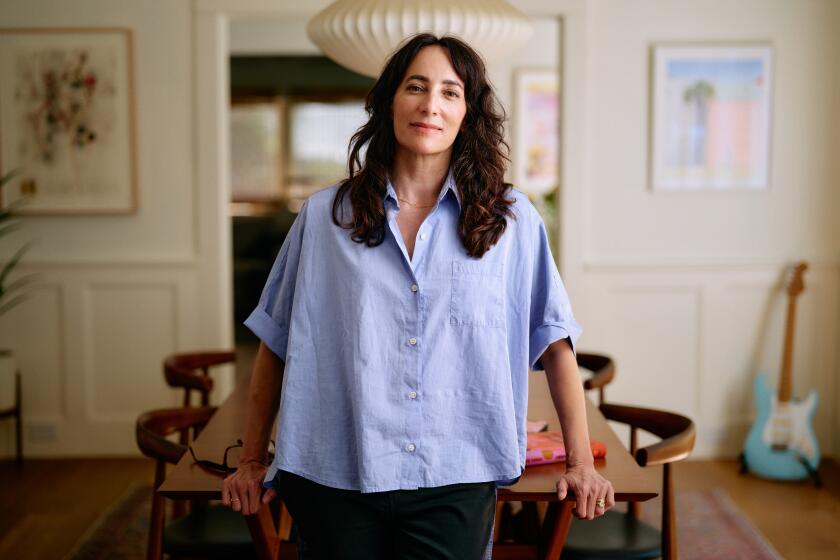I went down to the crossroads, with books about L.A.
It isn’t every day that you can read from a book and feel the words come to life before your eyes.
That happened to me Wednesday morning, at Union Station, at an event designed to make passing L.A. commuters hip to the upcoming Los Angeles Times Festival of Books.
Asked to read at Union Station at rush hour, I chose short passages from eight works of Southern California literature, including five novels, a book of poetry, a stage play and a memoir.
I was at a microphone at about 7:45 a.m., standing under the transit center’s East Portal, and began to read from Laleh Khadivi’s wonderful new novel, “The Walking,” and its description of the Los Angeles new Iranian immigrants encountered in the 1980s.
“Entire stretches and blocks of storefront windows were etched in Mandarin, Korean, Farsi, Thai,” I read, to the handful of people present. “There were parks where we felt good, at ease, where we could take our walks…and mistake the moment for another just like it in Tehran/Bombay/Seoul/Juárez/Hanoi.”
Suddenly, a rush of more than 100 commuters transferring from the Metro Gold Line to the Red Line subway passed before me, their faces a multicultural pastiche of portraits. It didn’t look like a train station in Tehran, or Bombay, or Kansas City, or Mexico City: rather, it were as if I was standing in all those cities at the same time.
L.A. is a crossroads, and today many of its residents are the children, or grandchildren of travelers who arrived here via Union Station, or LAX, or the 5 Freeway. But the city has always been a crossroads. I could feel that in another passage I read to the commuting crowds, from John Fante’s 1939 novel, “Ask the Dust.”
“The old folk from Indiana and Iowa and Illinois, from Boston and Kansas City and Des Moines, they sold their homes and their stores, and they came here by train and by automobile to the land of sunshine, to die in the sun, with just enough money to live until the sun killed them…”
A Latino man with two toddlers stopped to listen to me read Fante, and when I was done he applauded and said, “Thank you,” and rushed down the escalator with his kids to the Red Line.
As many more train loads of people walked past, I kept reading from other works:
-- From Karen Tei Yamashita’s “Tropic of Orange,” an account of a carjacker getting “jacked” himself in Koreatown;
-- “Artemis in Echo Park,” a poem by our new L.A. poet laureate Eloise Klein Healy, from her new anthology “A Wild Surmise”;
-- A passage from Thomas Pynchon’s “The Crying of Lot 49,” in which L.A. is compared to an electronic circuit board;
-- From Luis J. Rodriguez’s “Always Running,” a description of the “barrio beach” along the Rio Hondo in the Whittier Narrows;
-- From my own novel, “The Barbarian Nurseries,” a passage in which my protagonist, a Mexican maid, enters Union Station with the two boys in her care;
-- And finally, from Anna Deavere Smith’s stage play, “Twilight: Los Angeles 1992,” one of the greatest L.A. soliloquies ever written, a speech from a former gang member about the origin of his nickname. “Twilight Bey, that’s my name. When I was twelve and thirteen, I stayed out until, they say, until the sun come up…So to me it’s like I’m stuck in limbo, like the sun is stuck between night and day in the twilight hours.”
Truth be told, by the time I got around to “Twilight” the rush-hour crowds had thinned, and there were not a lot of people listening. One of my few interactions with my “audience” was with a man who asked me where he could catch the train to San Diego.
“Down that way,” I said, pointing.
Later, I took to the microphone and made an announcement to anyone and everyone who could hear me: If you’re in L.A. on April 20 and 21, come to the L.A. Times Festival of Books. There will be a lot of great writers there. Food and music too. It’s free. And if you’re lucky, you’ll be able to enjoy the literature without rushing to catch a train.
hector.tobar@latimes.com
ALSO:
Finalists for the Best Translated Books announced
Ben Yagoda explains how not to write bad. Badly, that is.
‘The Best of the Best American Poetry’: An embarrassment of riches
More to Read
Sign up for our Book Club newsletter
Get the latest news, events and more from the Los Angeles Times Book Club, and help us get L.A. reading and talking.
You may occasionally receive promotional content from the Los Angeles Times.











